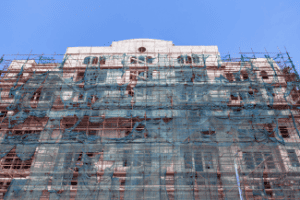Hotel-to-Apartment Conversions Gaining in Numbers

Here’s the surprise: adaptive reuse involving hotel-to-apartment conversions did well in 2022, making up 29% of the total inventory nationwide.
“One thing about adaptive reuse is that it’s not a cornucopia of abandoned buildings, just waiting for a transformation,” RentCafe’s Andrea Neculae told Connect CRE. “It’s highly dependent on available stock and how compatible that stock is with conversion.”
The Ongoing Office-to-Apartment Challenges
Offices buildings have multiple challenges with adaptive reuse. According to Neculae, who authored the RentCafe report, there’s been a great deal of talk about incentives and tax reductions to aid developers in revitalizing downtown areas. “The truth is that the office market seems to be stuck in a limbo of indecisiveness,” she said. Investors continue to take a wait-and-see approach as they await the impact of back-to-work mandates and the anticipated wave of distress. Then there is the cost of conversion.
“So, while on the surface, a high demand for housing combined with a low office vacancy rate may seem like the ripe conditions for converting into other types of assets, there are many hindrances to be considered: complying with housing requirements, making sure structural changes adhere to the cities’ regulations and accommodating multiple units with sewage and other issues,” Neculae said.
Enter the Hotels
The report indicated that the decline of previous hotel markets is the catalyst driving the current wave of hotel-to-apartment conversions. “Hotels typically already have a layout that is similar to residential buildings, with individual rooms, bathrooms and sometimes even small kitchen areas,” Neculae explained. “This reduces the need for extensive structural changes when converting.”
She said many hotel buildings are also already zoned for residential use, leading to a more straightforward transformation.”
The added plus is that this conversion type can deliver more affordable housing units. “In the last three years, 54% of hotel conversions have been repurposed for low- and middle-income renters,” Neculae said.

The Outlook
The report indicated that the future of adaptive reuse projects appears promising, with a potential 63% increase in upcoming projects. At this time, 122,000 apartments are undergoing conversion. Office is leading the way, with 45,000 apartments anticipated. “When it comes to future projects, office-to-apartments remain the preferred type of conversion, making up 37% of the total units expected to come online through adaptive reuse in the next years,” Neculae commented. “Only a quarter of the future office conversions are currently under construction, with the vast majority being in planned or prospective phases.
Source: Connect CRE
Get a Free Multifamily Loan Quote
Access Non-Recourse, 10+ Year Fixed, 30-Year Amortization















 Accessibility
Accessibility